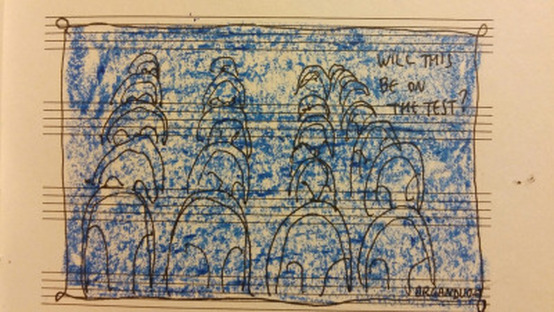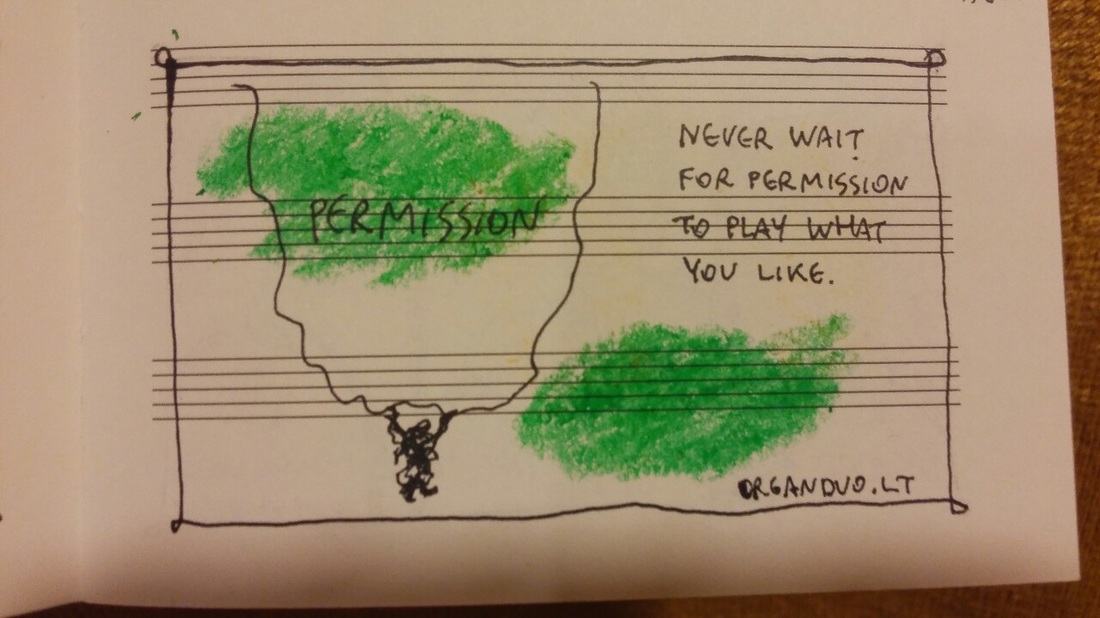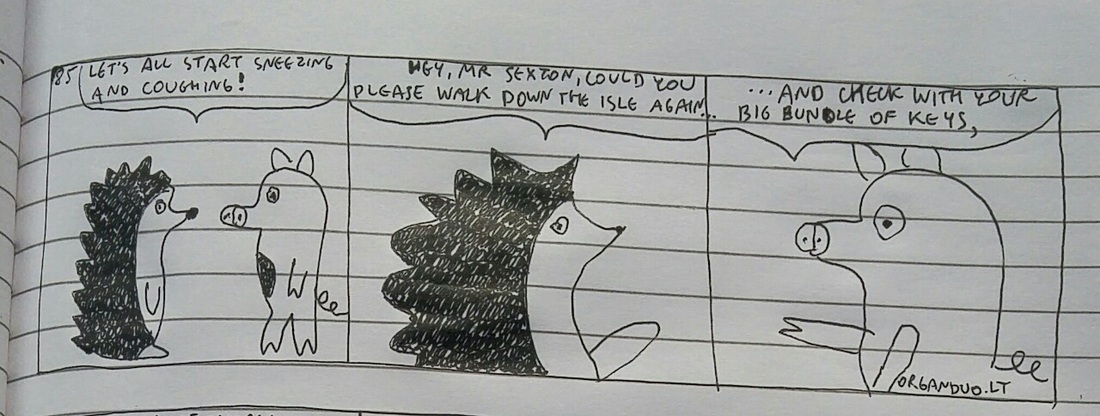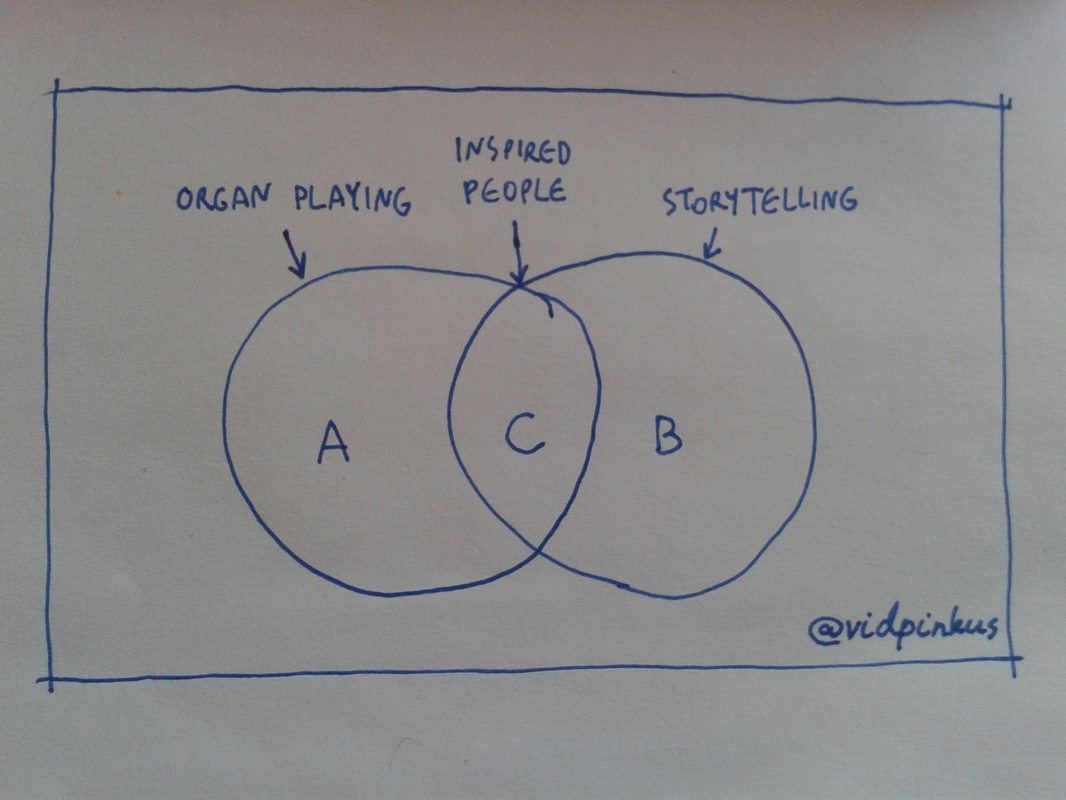SOPP564: Important to me is to take songs which are outside of the Church or Classic repertoire2/15/2020
Vidas: Hi, guys, this is Vidas.
Ausra: And Ausra V: Let’s start episode 564, of Secrets of Organ Playing Podcast. This question was sent by Jason. And he writes: Hello Vidas, Thank you for your email. My dreams are to be truly expressive in whatever I play. I want to do my own arrangements and improvisations to pieces. Important to me is to take songs which are outside of the Church or Classic repertoire. With these songs I would create interesting organ pieces with real musical depth, I’m talking about arranging music like Jimi Hendrix—Voodoo Child, David Bowie—life on Mars there are so many. Sticking with more standard pieces then new stuff like Hans Zimmer—Interstellar pieces would be great. But above all the knowledge and ability to arrange and play modern pieces. What is holding me back is my brain over complicating music theory. Thank you Jason V: Music theory is always a drag, right? A: Yes. V: Can you create arrangements and improvisations without knowing music theory? A: I don’t know, unless you are a genius, probably. V: Yeah, you can do intuitive things without knowing what you are doing, but then you cannot explain to others. A: That’s right. So I guess that knowing music theory is a crucial thing. V: Mmm-hmm. Of course, if you always can explain what you’re doing, it’s not always that interesting, right? A: True. V: It has to be some mystery. A: I know, but I think in nowadays there are no problems in creating sort of transcriptions. Because basically what he is talking about, Jason, it’s basically transcription. And I think that many of music software nowadays can do that for him. Or at least help to do it. V: Well, yes. For example, let’s take a song by David Bowie or Jimi Hendrix, right? Or Hans Zimmer. If he can get a hold of the score, like original score imitation, and then put it into Sibelius or Finale, any other software that does arrangements automatically, and with the press of a button he can specify how many voices does he want to have in each hand, how many stave mutations, if its suitable with pedals or without pedals, things like that, and he can specify the style, actually, and that would be produced automatically. I’m not sure if that’s the best result, but for starters it’s no-brainer. A: And I’m not really sure that’s a legal thing, because all these authors that Jason mentions in his letter, I guess they are still alive, still living, and I don’t know what about copyrights, and do you have a right to do arrangements with their music. V: Yeah. Jimi Hendrix and David Bowie, they are not with us anymore, but obviously copyright holds, uh… A: Yes, because I think it was hold like seventy-five years after death. V: In some countries seventy-five, in some fifty, after death. A: But still, you know… V: But of course copyrights can be renewed after that, so you have to be really careful. And license your arrangement. You can purchase licensing actually, and then do this legally. A: Sure. V: Can you do this for your own enjoyment, if you don’t share the music anywhere, just for your private use, legally? A: I think so. V: Do you think so? A: If it’s for yourself, yes. V: I am not so sure. I’m not a copyright lawyer, so don’t site me on this. Better to consult copyright lawyer on this, even for private use, if you’re creating like a cover song as they call it, if you create your own arrangement of the original copyrighted popular music song. That’s really complicated and guarded very, very fiercely by copyright holders. A: Yeah. And you know while talking about all this kind of music that Jason mentions, I’m not sure that organ is the best instrument for this music to be played on. V: Yes, for us. A: Some if it might work but some of it might just sound ridiculous. V: You know this is our taste and people have other tastes, you know, and what works for us not necessarily works for Jason and vice-versa. People enjoy for, example, listening to Queen’s Rhapsody in Blue. Not in blue... A: (Laughs). Bohemian Rhapsody. V: (Laughs). Yes. Who created Rhapsody in Blue? Gershwin. A: That’s right. V: Yes. Bohemian Rhapsody on the organ. Some people enjoy that. That’s not what my taste prefers though, but I don’t judge other people, not at this point in my life at least. What about you, Ausra? A: Me too! V: Freedom of expression should be available to all on earth, whatever they want to do. A: But let’s say that if Jason wants to do everything from the scratch by himself and he definitely needs to know music theory. There is no way to escape that. V: Well, that’s a good point, yeah. Something to think about if you’re serious arrangement and improvising based on those arrangements, you have to know what you’re doing and music theory helps to see the ideas behind music that composer or songwriter, in this case, have put into the piece. A: And you know, I guess because we are talking about popular music now, I think we have a little of their version of music theory too. So basically what applies to the common period may not be applied to the popular music. V: That’s right. A: So this is all another world. V: Yeah. Yeah, you have to do many experiments and do trial and error before you find what works and what doesn’t. That’s the best teacher, I think. A: Yes. V: Thank you guys. This was Vidas. A: And Ausra. V: Please send us more of your questions. We love helping you grow. And remember, when you practice… A: Miracles happen!
Comments
Vidas: Let’s start Episode 84 of #AskVidasAndAusra podcast. Today’s question was sent by Dan, and he writes:
“Vidas, I have been purchasing materials from you. I have about 3-4 years experience on the organ. I am using your resource for 8 Preludes & Fugues. I am only starting the 8 P&F series and have not mastered them. I also purchased BWV 565. I am trying to learn 8 P&F and BWV 565 all at the same, time taking bite sizes out of each one. Is BWV 565 too advanced for my level and should wait on this until after 8 P&F? Thanks Vidas”. Good question, right? About the ordering of your study when you master pieces by Bach, especially not based on chorale melodies. Free pieces like preludes and fugues, toccatas, fantasias, passacaglias, chaconnes, and things like that. So Ausra, the end of the collection is the eighth prelude and fugue--which is in Bb Major, right?-- Ausra: Yes. Vidas: Imagine that Dan has already mastered 8--will he have sufficient experience to tackle the long Toccata and Fugue in d minor? Ausra: I don’t think so. I think he has to learn something else first, before moving to d minor Toccata. Vidas: Because the Fugue is especially complex and virtuosic. Ausra: Yes. Vidas: Toccata might work… Ausra: Yes, Toccata might work but not Fugue. Vidas: Toccata is just three pages. But then, students should learn maybe more shorter fugues. Ausra: That’s true. Vidas: Like BWV 578, which is g minor Fugue; or preludes and fugues which are shorter. In e minor, BWV 533… Ausra: That’s a good choice, yes, Vidas: Or Prelude and Fugue in G Minor, BWV 535. I don’t know if we have fingering and pedaling created for this piece yet. Ausra: I don’t think so. Vidas: Probably not yet. But in general, in shorter preludes and fugues--you see, you have to understand that the Eight Little Preludes and Fugues, each probably lasts not more than...let’s say, three minutes? Ausra: Something like that. Vidas: And Toccata and Fugue in d minor lasts, what, ten minutes? Ausra: I think a little bit more--maybe twelve. Vidas: Maybe. Depending on who’s playing, and where you are playing it. Ausra: Yes, that’s true. Vidas: So, you have to have something in between, then: maybe a 5-minute piece, maybe 7-minute piece, a little bit longer. Even Pièce d’Orgue by Bach, BWV 572, is easier than Toccata and Fugue in d minor, probably. Ausra: Yes. Vidas: Because it doesn’t have that many virtuoso pedal passages. Ausra: That’s true. Vidas: Even though the middle section has 5 voices. Ausra: Yes. Vidas: So guys, please learn more shorter pieces by Bach. Ausra, would you think that chorale preludes also facilitate the learning process, too? Ausra: Of course. For example, if you would play Orgelbüchlein, you would learn all kinds of Baroque passages and figures. It would be a great help for you, when later on playing flashy pieces. Vidas: You have to remember that Bach created this entire collection--which, by the way, is not finished: he planned to finish 143 chorales, I think, but finished only 45 or 46--basically with the intent of covering an entire range of techniques, right? Ausra: Yes. Vidas: And you can discover the same techniques in free pieces, in preludes and fugues, as well. Ausra: That’s true. Vidas: So if you like Bach’s music, don’t neglect the shorter chorale preludes from the Orgelbüchlein collection as well. And there are longer of them, right? Like Schubler chorales. Ausra: Yes. Vidas: And Leipzig chorales, also. They all work to the perfection of your organ technique, probably. It’s a mix; you have to understand that your organ repertoire has to be quite varied, right? Ausra: That’s true. Vidas: Do you think, Ausra, that people should also practice Romantic music, with legato technique? Ausra: Yes, of course! Vidas: Why? Ausra: Well, you don’t want to play only one composer. Unless you are obsessed with it, I don’t know. But in general, you want to present various musical styles, from different times. Vidas: And of course, you go to different instruments... Ausra: Definitely. Vidas: And one instrument would be more suited for Baroque music; and another more for symphonic music, and for Romantic music, maybe; and the third instrument might be quite eclectic, and suitable for any kind of music rather well. Right? So...it’s like food, probably. We don’t eat just one sort of meal every day for months. That would not be healthy, probably, Ausra? Ausra: Yes. Vidas: We have a variety of meals throughout the day, and we mix them up during the week; and in general, that’s a quite healthy approach, I would say. Ausra: I think so, yeah. Vidas: And then some people have to take vitamins and supplements--in organ terms, it would be what--exercises, probably? Ausra: Yes, that’s true! Vidas: Exercises, and scales, and arpeggios, with your hands and feet. Ausra: And usually when you receive basic training in organ performance, you play various musical pieces. You must do that, you know: your program requires that--that you would play everything from like, late Renaissance to 21st century. But later on, when you graduate, then you will play what you want. And most of us focus more on, let’s say, Baroque music, or Romantic music, or modern music; but still we have to play various musical styles. Vidas: Exactly. For Dan--and others who (probably) are studying for their own enjoyment only, and don’t normally play, for example, in public very often, or in church services--can we suggest, Ausra, arranging a few possibilities to perform those pieces in a public setting, as well? Ausra: Yes, sure. Vidas: Would that be beneficial? Ausra: Yes, that would be very beneficial. Vidas: Like Dan says, he’s starting with 8 Preludes and Fugues; and once he has a couple of them mastered (or even one-), maybe he can go to a church in his town, get to know the organist, introduce himself...and ask to play on that organ. Maybe not in public first; but just play it through, to get familiar. And if the organist would approve of that, maybe in a couple of weeks, he could play that prelude and fugue as a postlude. Or prelude. Ausra: Definitely, yes. Vidas: That would be great public playing experience, which would probably enable Dan to go on to the next level much faster than just playing on his own. Ausra: That’s true. Vidas: Ok guys, please send us more of your questions; we love helping you grow as an organist. And you can do that by replying to any of our messages that you are getting as a subscriber to our blog at www.organduo.lt Wonderful! This was Vidas. Ausra: And Ausra. Vidas: And remember, when you practice… Ausra: Miracles happen.
Vidas: Let’s start now Episode 74 of #AskVidasAndAusra podcast. Today’s question was sent by David, and he writes, “Thank you very much for answering my question. I have the Ritchie/Stauffer book and started with Chapter 3 Early Organ Technique since I am working on Handel's Largo. I have a follow up question. When I master Handel's Largo, should I continue with another early music piece or change to modern music and start at the beginning of the Ritchie/Stauffer book?”
Ausra, do you think that people should practice simultaneously a few pieces of different stylistic periods? Ausra: You know, if you’re just a beginner, maybe do a few pieces of the early style first, and then go the modern style, and do a few pieces of the modern style; and then you can practice them simultaneously. Because if you will begin to practice simultaneously right away, it might be too difficult for you to differentiate these two such different techniques. And what do you think about it? Vidas: Absolutely true. And that’s the reason why Ritchie and Stauffer chose to do their book this way. They don’t mix their techniques this way, but they have one part of the book on modern technique and the second part on early technique. And actually, they start with the modern first. Do you know why, Ausra? Ausra: I think because most organists, when they begin to play organ, they come after playing piano for many years, or at least a few years; so the modern technique is easier for those who have practiced piano before. Vidas: True. So, for David, I think he could start working on Ritchie-Stauffer’s exercises from the Early Technique section right away; and at the end of that section he will find a few of the early music pieces suitable for that technique that he just learned, right? Ausra: Yes. So just do the mixture of exercises and real music pieces, but learn more of early music pieces, and then go on to modern technique. Vidas: And after that--after you have mastered a few pieces from early repertoire, a few from the modern, legato repertoire--can you learn a few of them simultaneously? Ausra: Sure, yes; after some time you can do that. But not right at the beginning. It probably would be too hard. Vidas: You wouldn’t recommend, like, on Mondays you do early technique, on Tuesdays… Ausra: Well, I wouldn’t do that at the beginning. It’s not so easy to master each of them, so you might experience too much trouble. Vidas: True. When did you first discover that you need to play several stylistically different pieces simultaneously? While at the Lithuanian Academy of Music, probably? Ausra: Yes. Vidas: When you had to play recitals… Ausra: Yes. Vidas: And people appreciate variety in recitals. Ausra: Sure. Vidas: So that’s why you need a lot of stylistic differences right away. Ausra: But when I started to practice organ for the first two months, and it was intensive practice, I played early Baroque music--so, early technique; and that was a good thing. And then later on, I started to practice Romantic and later music. Vidas: Me too. I remember this well. What to do for people who don’t have the Ritchie-Stauffer book? Can they still practice in a similar order? Ausra: Sure, why not? Vidas: Basically, early music first, probably? And then, like, modern or Romantic music later. Or vice versa, you could reverse that, if you are a better pianist. Ausra: Yes, that’s true. Vidas: How many pieces do you think they would need to feel comfortable with one technique at first, and ready to switch to another technique? 3, 4, 5? Ausra: Well, it depends. For some, yes, that might be 3-4, but for some, it might be like ten pieces. Ausra: I think it might be very different for each person. Vidas: With every new piece in that stylistic repertoire, you will discover something new about yourself, and your instrument, and your music; it will be like a small experiment, exploration; you will feel like a scientist, exploring new, unfamiliar lands. And every tenth piece, you will probably have a small breakthrough--don’t you think, Ausra? Ausra: Yes, I think so. Vidas: Excellent, guys. We hope this has been helpful to you in your practice. And please send us more of your questions; we really love helping you grow as organists. This was Vidas! Ausra: And Ausra! Vidas: And remember, when you practice… Ausra: Miracles happen. Welcome to Secrets of Organ Playing Podcast #105!
Today's guest is Arnoldas Leleika. He is our student from Vilnius University majoring in Chemistry but hopes to transfer to Medicine next year. He's just finished his freshman year and right away started playing the organ at our Unda Maris studio from last September and currently has chosen 3 pieces for the upcoming competition for young organists. Arnoldas is very hardworking and motivated organ student and Ausra and I are very delighted that he came and found us in the organ studio. He substituted for me a number of graduation ceremonies and recently performed at Unda Maris organ studio concert. You can read his thoughts about these experiences here and here. In this conversation Arnoldas shares his insights about finding more practice time, choosing your organ repertoire wisely and expanding your musical horizons. Enjoy and share your comments below. And don't forget to help spread the word about the SOP Podcast by sharing it with your organist friends. And if you like it, please go over to iTunes and leave a rating and review. This helps to get this podcast in front of more organists who would find it helpful. Thanks for caring. Listen to the conversation Relevant links: Arnoldas Leleika on Facebook and YouTube Do we have the freedom to choose to play and study what matters to us or do we only play what's required? Watch this video with insights from me and Ausra and share your opinion in the comments. My student came up to me and said, "May I play the Fantasy by Saint-Saens? Will I be able to learn it?" I wondered why does she want to master it and asked her if she intends to play this piece for one of the competitions we are preparing. To this she replied, "No, I'd like to learn it just for fun." Then we looked together at the score and discovered fairly manageable first section but the ending looked fierce. I said to her, "Prepare to spend some months with it." My student thought I was disapproving her choice and asked, "So you don't want me to play it?" Then I replied to her, "Never ask for permission to play what you like." What I could have said is this, "If you feel fear of not being able to do it then you should play it." Nothing is worse for an organist than this feeling of helplessness when you know you have to play an organ recital in a few months but you don't have enough pieces mastered and you are a slow learner. Should you cancel the recital ahead of time to be polite for the organizers or is there some kind of other choice you could make?
I think there is, and I'd like to say special thanks to my friend John Higgins who pointed out this solution to me. You see, you don't have to play all newly mastered pieces for your recital. And you don't have to play pieces that somebody else wrote at all. Let me explain. First let's calculate some timings here and aim for an average 60 minutes organ recital. More than that would be difficult for the listeners. You could play a shorter recital but for the sake of example let's keep it around 60 minutes. Think of the title of your recital. Choose about 3 words for the title to keep it easy to remember. This is crucial for publicity campaign you will be doing a few weeks before the recital so that people would actually want to come to listen to you play. If you don't have a coherent theme or topic which would keep all the pieces under one umbrella, you can choose a name of one particular piece as the overall title of your recital. If you have some previously prepared compositions under your belt, now it would be a great time to refresh them. Find as many contrasting pieces that would work together for this theme and that you would want to play and calculate the time. Maybe you will have 15 minutes this way, maybe 30 minutes. Let's stick with 15 minutes for now. Then if you have a couple of months left, perhaps you could learn a piece or two from scratch. Let's say it would be 5 minutes. So now with the new piece you have 20 minutes total. What to do with the rest of 40 minutes? If you have some hymns that your listeners would enjoy, choose 2 or 3 settings and play a few verses of each. This would be around 10 minutes. To make hymn playing more interesting choose different registration for each verse and place the hymn tune in a) soprano, b) tenor, and c) bass. For the soprano it's easy - open your hymnal, take a solo reed stop or Cornet with the right hand, place alto and tenor in the left hand on the softer registration and play the bass with pedals on the 16' stop as the basis. When the tenor has the hymn tune, play it with the left hand one octave lower with a strong reed, such as Trompette and place alto and soprano in the right hand. You can still use the hymnal for this but hymnal's tenor becomes your soprano now. The pedals still play the bass. When the bass has the hymn tune, play on Principal Chorus registration with mixtures and with the addition of Posaune in the pedals. But here's the tricky part - you can't use the harmony from the hymnal. You have to re-harmonize it. It's best to keep 3 upper voices on the same manual and moving in the opposite direction than the bass. This way you will avoid forbidden parallel fifths and octaves. 30 minutes left now. You see how we have calculated the choices for the half of the concert. So far so good. Now here's what I would recommend next (and this may sound scary for some of my readers). You could improvise. That's right - you could improvise a piece or a few pieces during your public concert. If you have never improvised in public before then you either a) practice improvising a lot in private first or b) postpone improvisation for the later date. It's really up to you. Only you know your strengths and weaknesses. But if you choose to improvise a piece or two, then your listeners would be amazed, especially when you tell them that this is the first and only time they will hear you perform this way for them. Because the next time your improvisation (if it's a true improvisation) will be different. You could improvise on the hymn tune that they know and appreciate. In this case you can improvise a chorale prelude or chorale fantasia on some known hymn tune. Alternatively you could choose your own theme. Stay with the form that is coherent and easy to follow. An ABA form usually works best as well as ABABA (if subsequent B and A parts are shorter and in other keys than in the beginning to keep it interesting and engaging). Remember, you could improvise on a well-known story, perhaps a folk story or a legend or a story from the Bible. Then your job is to depict this story with musical means. In this case the form will be much more free. Keep the registration changes and texture constantly changing to fix your listener's attention. Embrace the power of modal improvisation. It works for almost any occasion. Storytelling improvisation can be quite long, if you can keep it exciting and full of surprises. You can even fill the entire half of the concert with this. Besides improvisations, you can demonstrate the organ at your venue. Again organ demonstrations can be long but you can do it a brief version in 20-30 minutes. Here too, improvise on separate stops showing off the colorful side of your instrument. Demonstrate different families of sounds - principals, flutes, strings, and reeds. Combine stops in surprising and fresh ways. Don't hesitate to use 4' flutes - usually every organ has at least one nice flute of this pitch level. Show the deepest and the highest sounds the organ can make. Now the best part in this is storytelling. To keep your listeners wanting for more explain briefly how the organ looked like in ancient Greece, in the Middle Ages, and other periods in history. Explain how the mechanics of the organ work. Tell them even about how the sound is produced, about the pipes and their materials and construction. Tell a personal story or two about your experience with some aspect of the organ. Invite people to see and touch the organ from up close. Some of them may even try to play it with their hands and feet. Although this is improvisation too, remember to practice it diligently. Maybe prepare one demonstration first for your family members and then for your closest friends one month before the real recital. This would feel like run-through before the big thing. It will expose any weak areas in your recital that would require more practice and work. If you are not sure about improvisation, the great thing about demonstration is that it can be done quite effectively almost entirely on hymns people know and love. If you spend about 1 minute on one stop, then that's perfect - that's the duration of 1 verse of the hymn. To keep hymn demonstration more interesting, you can play one hymn in different keys and in different modes (major/minor or any other). New colors will be a great surprise to people. If you want, you can use 3 hymns this way for the entire demonstration. And don't forget to vary the texture from time to time playing in 2, 3, or 4 voices, placing the tune either in soprano, tenor, or bass, and changing the rhythm and meter of the hymn tune from double to triple. Prepare to answer people's questions after or during the demonstration because there will be many (if the listeners aren't shy and if you do your storytelling with enthusiasm and good articulation). So you see, how you can use your constrain of lack of time and repertoire to your advantage and plan your recital very creatively. But make no mistake - these recommendations will still require a lot more time than you think to prepare, but perhaps less than learning new pieces for the entire recital. Above all remember that your contagious passion in communicating stories that resonate with people will inspire far more hearts than your organ playing alone ever will. Did I miss something? Share your ideas in the comments. [HT to John] |
DON'T MISS A THING! FREE UPDATES BY EMAIL.Thank you!You have successfully joined our subscriber list.  Photo by Edgaras Kurauskas Photo by Edgaras Kurauskas
Authors
Drs. Vidas Pinkevicius and Ausra Motuzaite-Pinkeviciene Organists of Vilnius University , creators of Secrets of Organ Playing. Our Hauptwerk Setup:
Categories
All
Archives
July 2024
|
This site participates in the Amazon, Thomann and other affiliate programs, the proceeds of which keep it free for anyone to read.
Copyright © 2011-2024 by Vidas Pinkevicius and Ausra Motuzaite-Pinkeviciene.
Terms of Service and Privacy Policy
Copyright © 2011-2024 by Vidas Pinkevicius and Ausra Motuzaite-Pinkeviciene.
Terms of Service and Privacy Policy









 RSS Feed
RSS Feed